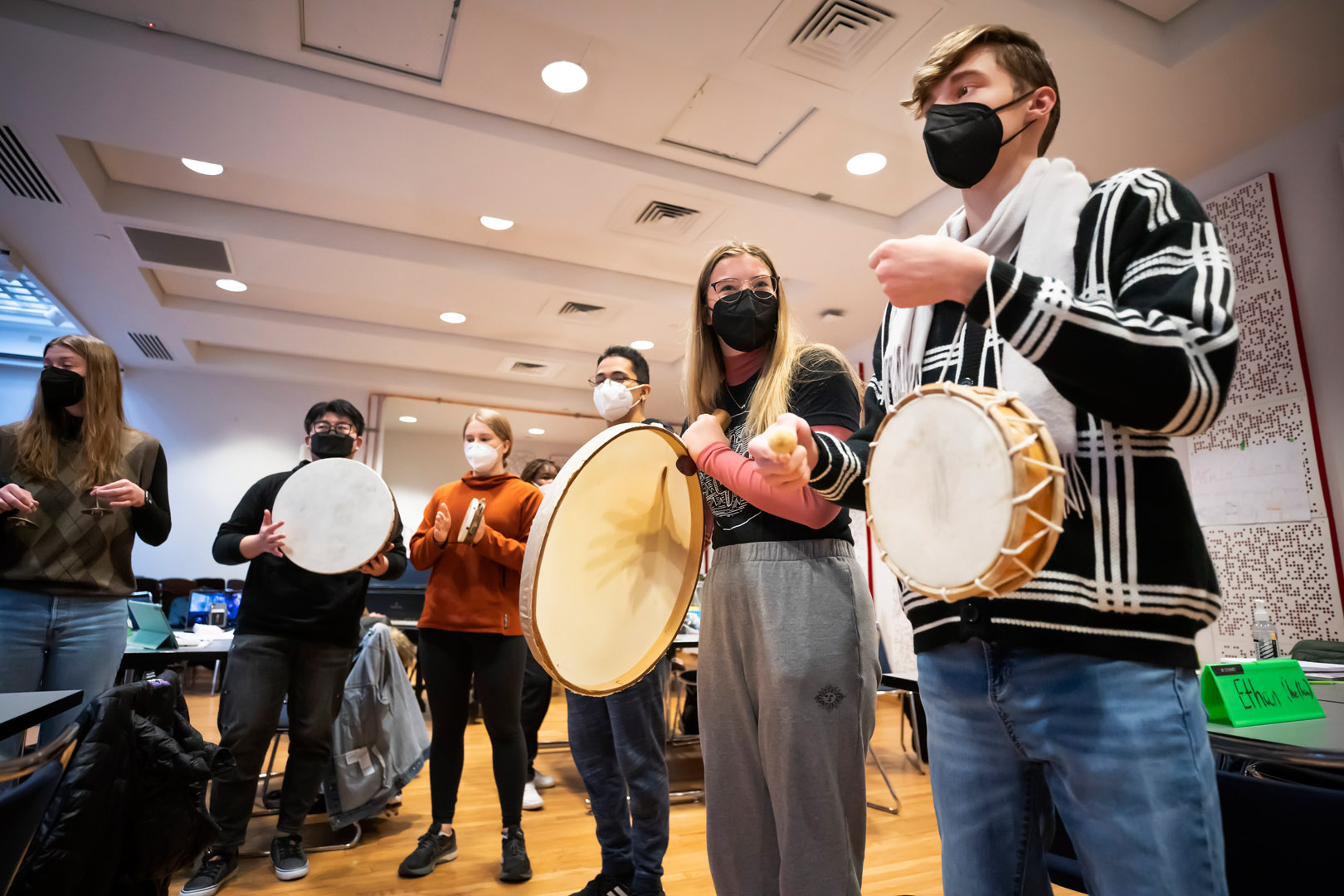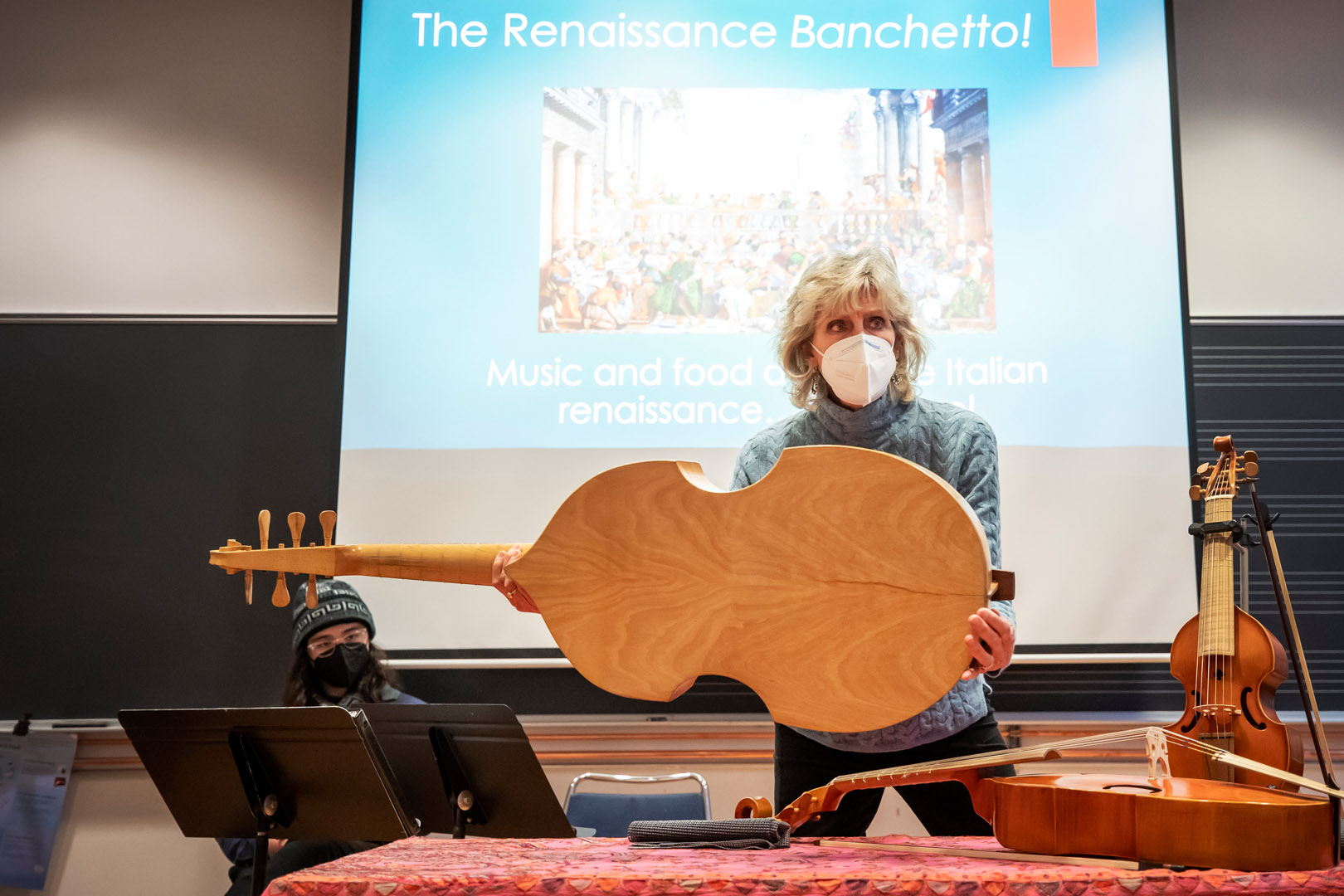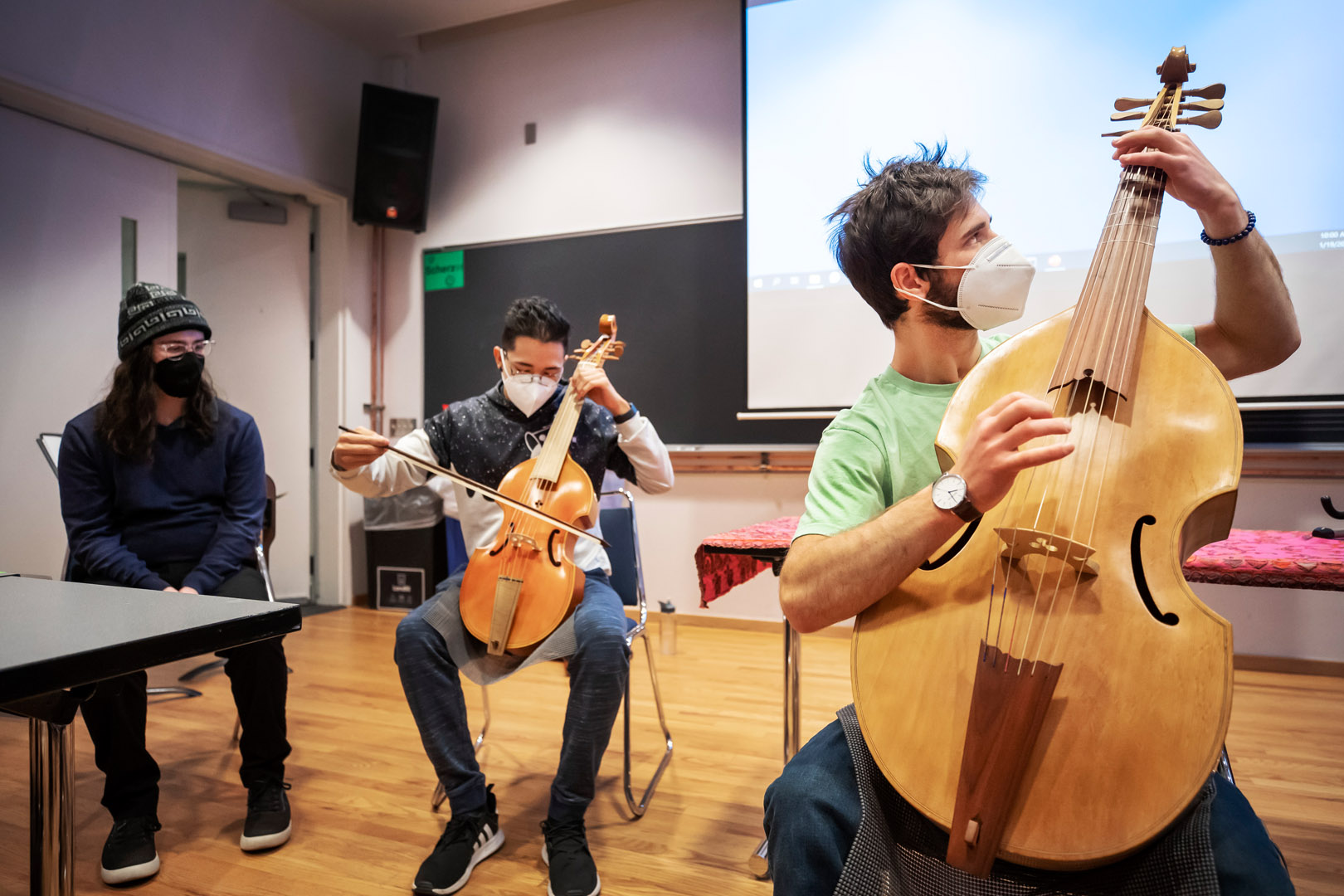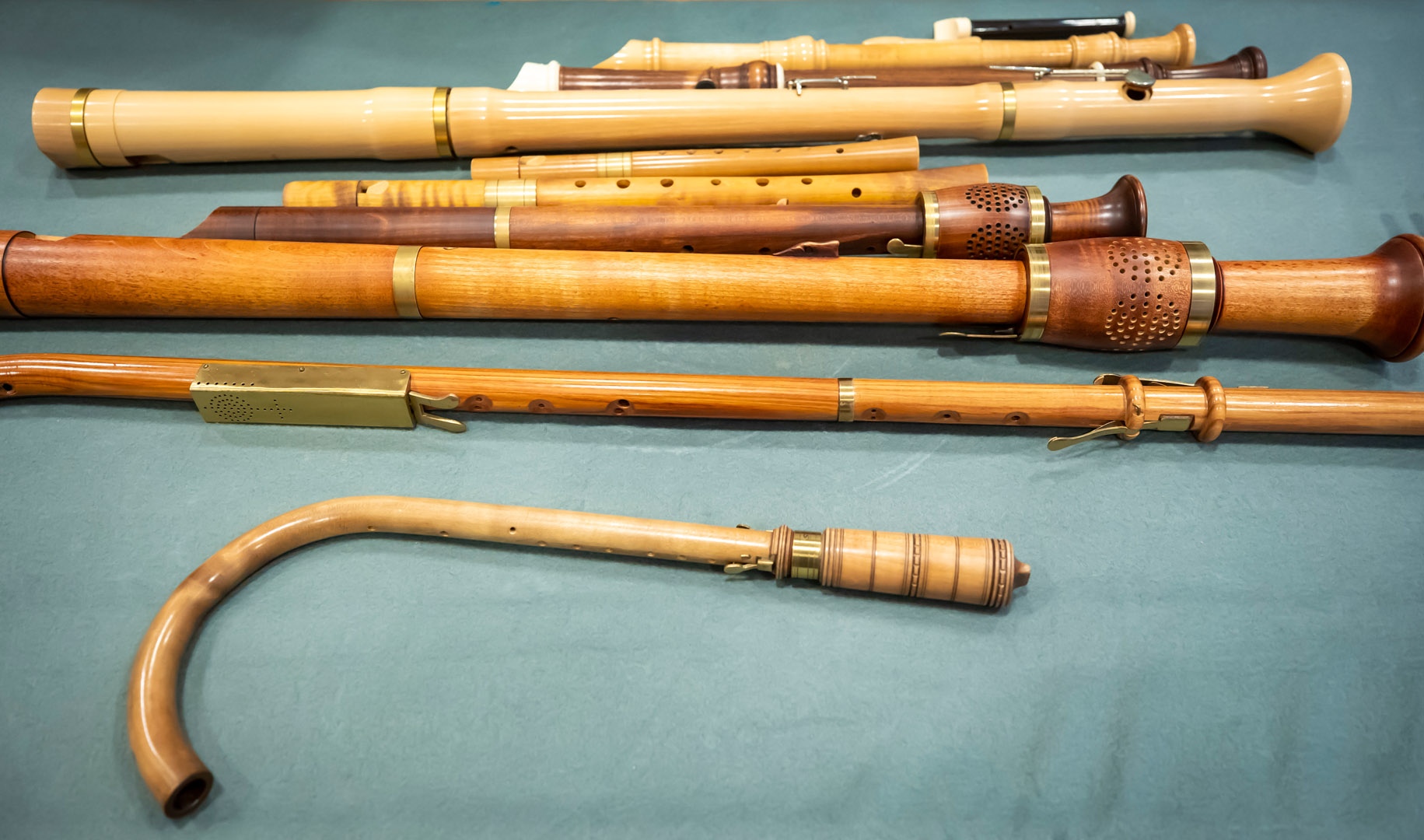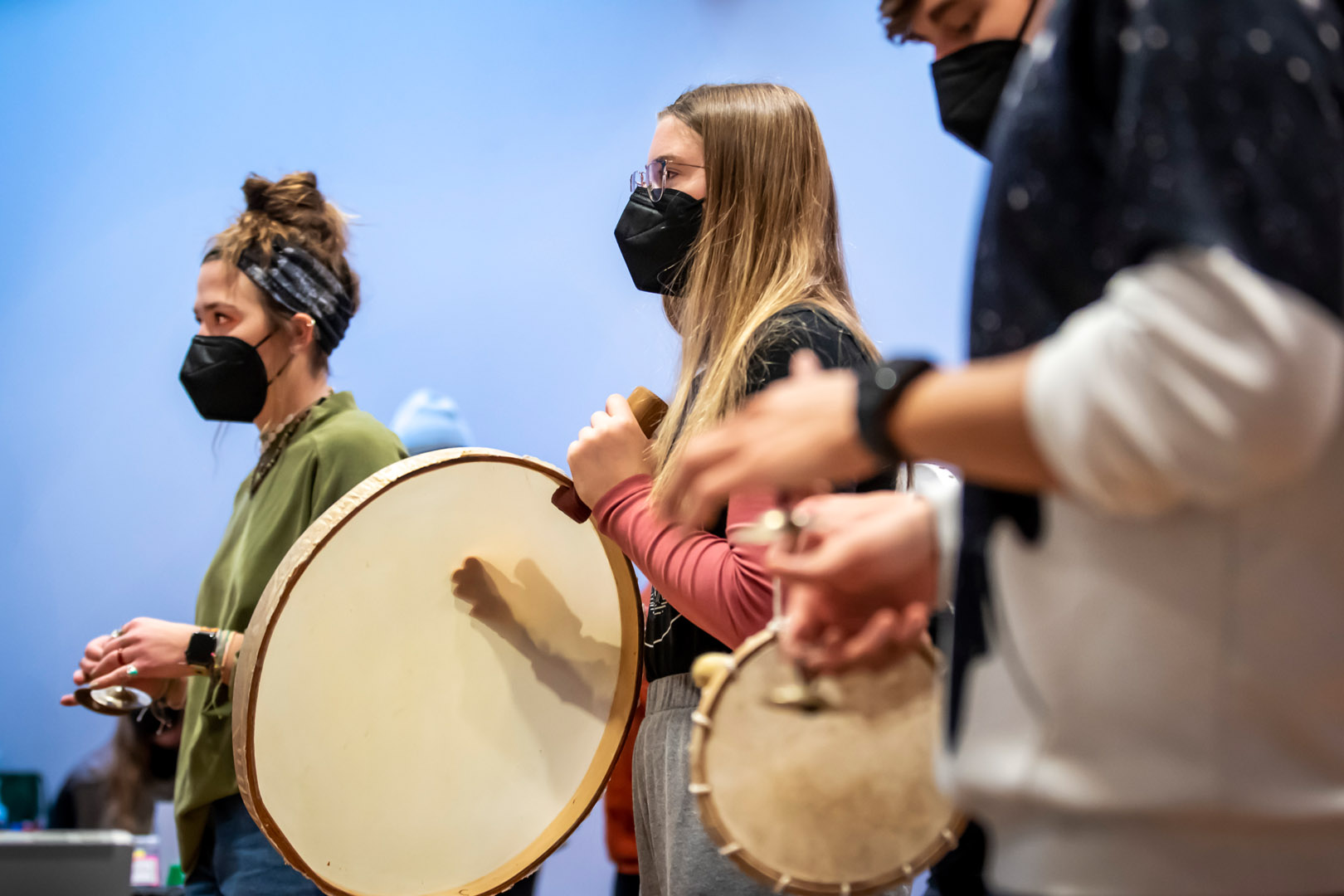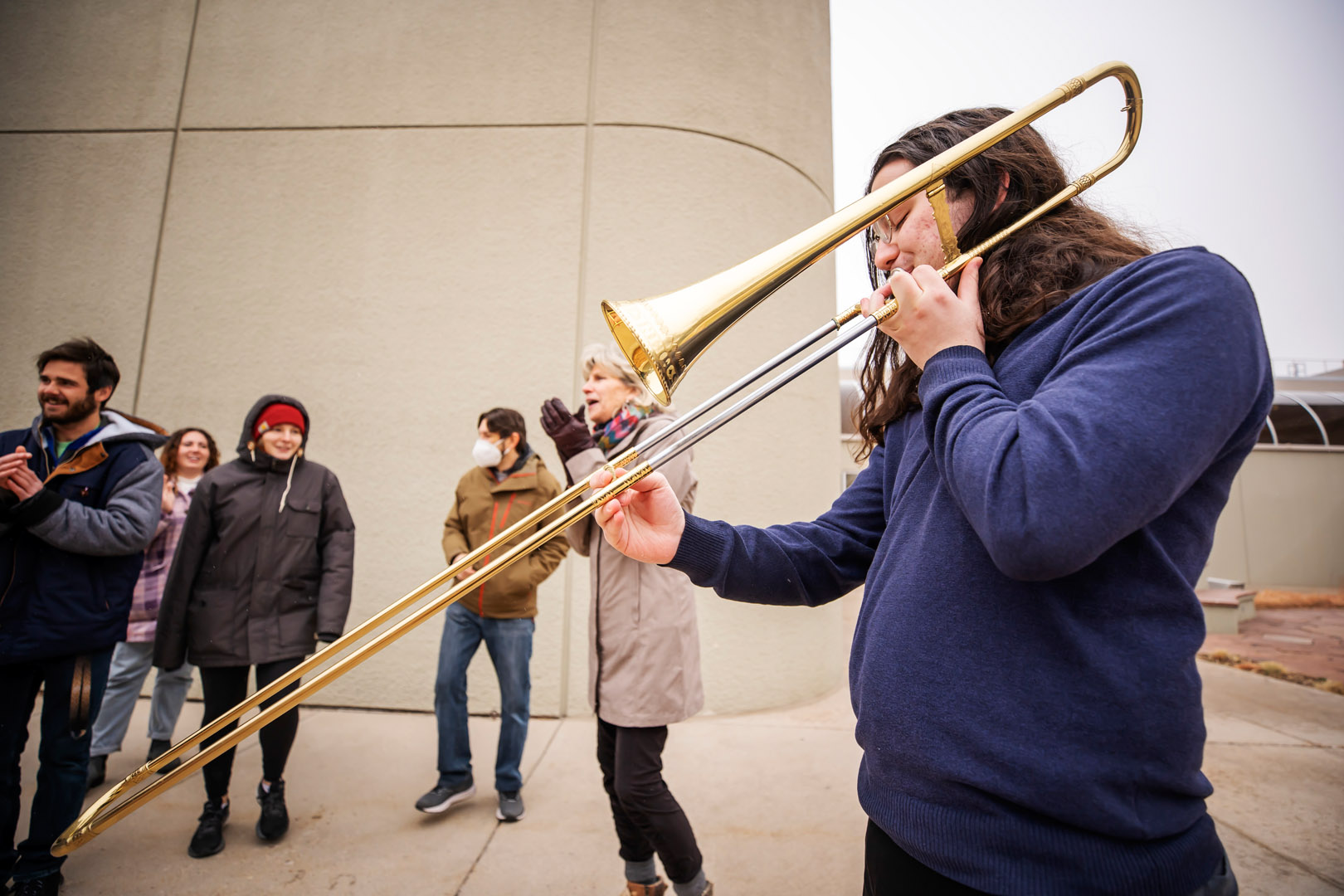If you could choose to be transported to the height of the Italian Renaissance, with all of its lavish banquets, bright marble cities, grisly assassinations, and clandestine poisonings … would you?
The students of the Renaissance Banchetto, a for-credit Half-Block course, chose yes. For the nine days of Half Block, offered Jan. 11–21, 2022, they sampled from a banchetto — a banquet — of history, music, cuisine, and political intrigue, using all of their senses to experience what life might have been like at the peak of Europe’s rebirth.
On a typical morning of class, co-taught by Nancy Ekberg ’74, performance faculty, and Dario Sponchiado, visiting instructor, the students gather in Packard Hall to make music together. They try early versions of familiar instruments, like lutes, crumhorns and viola da gambas — ancestors of today’s cellos and guitars — or hand-crank the wheel of a hurdy-gurdy to create the sounds of a bagpipe. Some students form an impromptu quartet, mixing the low hum of the viola da gamba with a Renaissance drum. Others have prepared a recorder trio, weaving warm, light harmonies into a composition fit for a noble hall. At one point, the students burst into laughter at the honk of a crumhorn. “Bravissimo,” cheers Ekberg, followed by classroom-wide applause.
Later, more soberly, they’ll study the era’s political rivalries, religious rebellions, and the constant threat of war. For all its splendor, the Renaissance — a cultural, artistic, and scientific revitalization spanning the 14th to 17th centuries — was a time of violence and upheaval, too.
Yet lighter topics abound. If the mornings are for music and history, the afternoons are for cooking and feasting. One snowy afternoon, students roll out thin sheets of striped dough, colored yellow from turmeric and red from beet juice and harissa, to represent the flag of Naples. They nestle amber egg yolks into circles of ricotta cheese, settle a sheet of dough on top, and cut individual scalloped raviolo with a tiny pinwheel. The recipe calls them to boil each plump parcel for the time it takes to say the Lord’s Prayer three times — about two or three minutes. They serve their homemade pasta slathered with sage butter and covered, of course, with a mound of tender parmigiano.
If the class sounds like a dream come true, that’s because it is. Offered since 2019, last year, the Renaissance Banchetto was only taught virtually. This year, thanks to increased safety precautions, students are able to gather together, to break bread, to play music, and to learn side-by-side once again. Ekberg also noted that a generous grant received from Creativity & Innovation at CC helped to support the course in 2022.
“Every student is so eager to be here, and open to the experiences of the class,” says Ekberg. “Everybody is craving connection right now, and that makes this course very special.”
Ekberg not only directs the Collegium Musicum at Colorado College, but also teaches lessons on the recorder and other early instruments to CC students. In the Banchetto class, she plays daily videos of traditional Renaissance-era instruments and voices, then asks students to respond. “What did you hear?” she asks. “What emotional response did this provoke?”
Just as playing the era’s complex musical rhythms and syncopations asks students to tune into each other, the questions ask them to tune into another time. Uncannily, one aspect of their curriculum remains in perfect harmony with the modern day: the Black Death, also known as the bubonic plague.
“This year, it’s been very interesting to consider the history of the plague,” Ekberg says. “History repeats itself, and I think we have seen that the COVID-19 pandemic has altered our perspectives and practices just as the Black Death altered life in Renaissance times.”
Exploring a historical epidemic has been strangely comforting, Ekberg continues, because it lends context to our modern times. As the bubonic plague swept through European cities during the late Middle Ages and early Renaissance, concerns arose that now feel deeply familiar.
While some individuals believed that God was angry or that the planets were at war, through observation, Renaissance physicians began to wonder if contagion was to blame for the spread of the plague. Some physicians attempted to convince townspeople to take their religious observances to home balconies rather than crowded streets and churches — something we might recognize as social distancing. Many sailors and travelers coming from plague-infested areas were barred from entering towns until a month had passed — much like a quarantine. Civilians even sang hymns and banged pots and pans from their windows, just as modern individuals did in the early days of the COVID-19 pandemic to celebrate healthcare workers.
Familiar power struggles emerged, too, Ekberg explains. Tensions flared between civic-minded individuals, who were concerned about economic depression and supply chain issues, and the medical-minded, who desperately sought to diagnose the disease, to quarantine the sick, and to find a cure.
“There are some real parallels,” Ekberg concludes, “and today, we’re seeing that some practices — and some feelings and experiences, like divisiveness or anxiety — have endured through the centuries.”
Yet for students, the most enduring aspect of the course might not just be their studies and musical explorations, but a feeling of closeness with each other. In true CC spirit, cooking, breaking bread, and sharing weeks of class time has brought the students together.
“Playing the music together was a little stressful the first few days. We were new to each other and the class, and unsure of what to do,” says Mira Giles-Pufahl ’25, a first-year student in the course.
“But now it feels really natural when we’re all standing in a circle playing music together,” she continues. “Our table assignments change every day, and we’ve done two group projects, so we’re constantly working with other people and interacting with each other. I feel very close to everyone in class.”
Just like modernizing a ravioli recipe from the 14th century, studying the Renaissance can make the lessons of the past feel fresh and relevant. But for CC students, some things are timeless: gathering in a circle to make music, to cook dinner, to laugh — and to find meaning and connection in the act of learning, together.

